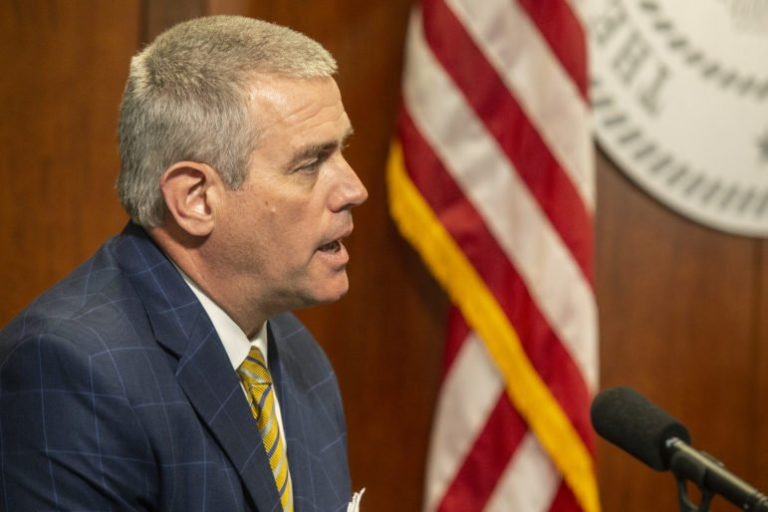

Eric J. Shelton/Mississippi Today
Mississippi House speaker Philip Gunn speaks during Gov. Tate Reeves press conference at the State of Mississippi Woolfolk Building in Jackson, Miss., Thursday, May 7, 2020.
The board that governs Mississippi’s public employees retirement system could revisit and reverse its ruling that retired educators and state and local government retirees can serve in the Legislature while continuing to draw their pensions.
The Public Employees Retirement System Board had requested an IRS ruling on whether its decision could negatively impact the federal tax exempt status of the system, which could be detrimental for the system and its members.
The board had voted in 2019 to change its regulation to allow the public retirees to serve in the Legislature and draw their pension as they do in other states, such as Florida. But in making the change, board members said they needed approval of the IRS.
In a letter sent to the PERS Board in early May, officials at the IRS said: “In this particular instance we have determined that we cannot issue a ruling based on the factual nature of the matter involved.”
When contacted, the IRS refused to provide any additional details. And PERS officials only referenced the letter and indicated the issue would be discussed by its governing board as early as its next regular meeting on June 23.
Members of the House leadership believe the IRS ruling – or lack of ruling – means that the PERS Board will have to reverse its ruling allowing public retirees to serve in the Legislature and draw their pension or risk losing the tax exempt status.
“My understanding of the issue is the absence of the IRS endorsement changes everything,” said House Speaker Philip Gunn, R-Clinton. “It puts the tax exempt status of the plan in jeopardy.”
House Pro Tem Jason White, R-West agreed. He said if a request is made and the request is not granted: “Isn’t it the same as saying you can’t do that?”
The House leadership has opposed the change in regulation to allow public retirees to serve and draw their pension from the very beginning. Gunn argued the PERS change conflicted with existing state law.
For years, PERS’ regulations prevented public employees from serving in the Legislature and drawing their pension. But in late 2018, former Attorney General Jim Hood issued an opinion – based on a question from an elective official – saying that public employees could serve in the Legislature and draw their pension as long as they received only a portion of their legislative pay. Public employee retirees already can work part time for other governmental agencies. Hood ruled that they also should be allowed to serve in the Legislature.
In the 2019 election, four public retirees – all Republicans – were elected to the House with the expectation that they could draw their pension while receiving partial legislative pay. But the House leadership – despite the PERS change in regulation – refused to reduce the pay of the four members, meaning they were ineligible to receive retirement pay.
Two of the four members – Ramona Blackledge, former Jones County tax assessor/collector, and Billy Andrews, former Lamar County judge – already have stepped down from the legislative seats. The other two, Jerry Darnell of DeSoto County and Dale Goodin of Richton, both retired educators, are still serving and forgoing their monthly retirement benefits.
“It will eventually be resolved,” Goodin said. “You can’t continue to take people’s rights away.” Goodin and others have argued not allowing retired public employees to serve and draw their pension takes away a right from them that others, such as retirees from the private sector, have.
When PERS board members changed the regulation, they did so with the understanding that they might have to rescind the change if not approved by the IRS.
Retired public employees in other states are allowed to serve in their legislatures without their system being penalized by the IRS. The four elected officials told Mississippi Today this year that they do not understand why Mississippi is different.
For instance, Florida law says specifically “any retired state employee who is presently drawing retirement benefits under any state retirement system may, as any other citizen, serve in the Legislature without affecting in any way his or her retirement status or the receipt of retirement funds while a member of the Legislature.”
PERS Executive Director Ray Higgins said earlier the IRS might allow public employee retirees to serve in the legislature in other states without losing their pension and not allow it in Mississippi because “each state has different laws, regulations, and retirement plan designs.”
Most employees of state and local governments, public schools K-12 and university employees, participate in Mississippi’s retirement system, contributing 9 percent of their salary for retirement benefits.
According to PERS data, the average benefit is more than $23,100 annually for the more than 100,000 people drawing benefits. In total, more than 300,000 are in the public employees retirement system either drawing benefits, having paid into the system or currently paying into the system.
The post Public retirees likely to lose ability to serve in Legislature without losing retirement benefits appeared first on Mississippi Today.
- UMMC clinic closures extend to Friday amid cyberattack recovery - February 25, 2026
- Regency Hospital in Meridian to close by mid-March - February 25, 2026
- Advocates call for funding, collaboration as more Mississippians are expected to struggle with food insecurity - February 25, 2026